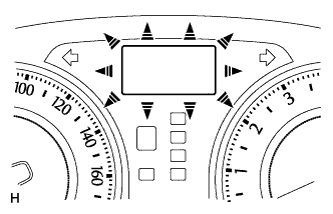Meter / Gauge System -- On-Vehicle Inspection |
| 1. INSPECT SPEEDOMETER |
Check the operation.
Using a speedometer tester (calibrated chassis dynamometer), check the speedometer indication according to the table below.
Reference: mph (for Europe, RHD) Chassis dynamometer indication Acceptable range 20 mph 21.0 to 23.5 mph 40 mph 42.0 to 44.5 mph 60 mph 62.5 to 66.0 mph 80 mph 83.1 to 87.1 mph 100 mph 103.9 to 108.4 mph 120 mph 124.7 to 129.6 mph 140 mph 145.4 to 150.7 mph Reference: km/h (Except for Europe, RHD) Chassis dynamometer indication Acceptable range
Data in ( ) is for reference20 km/h 21.0 to 25.0 km/h 40 km/h 41.7 to 46.2 km/h 60 km/h 62.7 to 67.2 km/h 80 km/h 83.4 to 88.4 km/h 100 km/h 104.3 to 109.3 km/h 120 km/h 125.1 to 130.6 km/h 140 km/h 145.8 to 151.8 km/h 160 km/h 166.2 to 173.2 km/h 180 km/h 188.9 to 194.5 km/h 200 km/h 207.7 to 215.7 km/h 220 km/h 228.4 to 236.8 km/h 240 km/h 249.2 to 258.0 km/h - NOTICE:
- Tire wear as well as over or under inflation will cause errors.
Check the deviation from the acceptable range of the speedometer indication.
- Reference:
- Less than 0.5 km/h (0.3 mph)
- HINT:
- If the indication is not as specified, go to problem symptoms table (Click here).
| 2. INSPECT TACHOMETER |
Connect a tune-up tachometer, and start the engine.
Compare the test results with the tachometer indications.
DC 13.5 V, at 25°C (77°F) Chassis dynamometer indication (rpm) Acceptable range
Data in ( ) is for reference700 630 to 770 1,000 (900 to 1,100) 2,000 (1,850 to 2,150) 3,000 2,800 to 3,200 4,000 (3,800 to 4,200) 5,000 4,800 to 5,200 6,000 (5,750 to 6,250) 7,000 6,700 to 7,300 8,000 (7,700 to 8,300) - HINT:
- If the indication is not as specified, go to the problem symptoms table (Click here).
| 3. INSPECT ENGINE OIL PRESSURE SWITCH |
Disconnect the connector from the engine oil pressure switch.
Turn the engine switch on (IG).
Ground the terminal of the wire harness side connector, then check the low oil pressure warning light.
- OK:
- Oil pressure warning light comes on.
- HINT:
- If the warning message is not displayed, go to the problem symptoms table (Click here).
| 4. INSPECT ENGINE OIL LEVEL SENSOR |
Disconnect the engine oil level sensor connector.
Turn the engine switch on (IG), and check the multi-information display.
- OK:
- "LOW ENGINE OIL LEVEL" message is displayed.
- HINT:
- If the warning message is not displayed, go to the problem symptoms table (Click here).
| 5. INSPECT MULTI-INFORMATION DISPLAY |
Turn the engine switch off.
 |
Press the "DISP" button and hold it down.
Turn the engine switch on (IG).
- OK:
- All the dots in the multi-information display come on.
- HINT:
- This test is also available on "Data List / Active Test" (Click here).
Turn the engine switch off to finish this test mode.
- HINT:
- If the result is not as specified, replace the combination meter assembly.
| 6. INSPECT FUEL SEDIMENTER WARNING SWITCH |
Disconnect the connector from the fuel sedimenter warning switch.
Turn the engine switch on (IG).
Ground the terminal of the wire harness side connector, then check the sediment warning light.
- OK:
- SEDIMENT warning light comes on when all of the conditions below are detected.
- HINT:
- Engine switch is on (IG).
- Fuel sedimenter warning switch detects a malfunction.
- Accumulation running time is 30 minutes or more.
- HINT:
- If the warning light does not come on, go to the problem symptoms table (Click here).